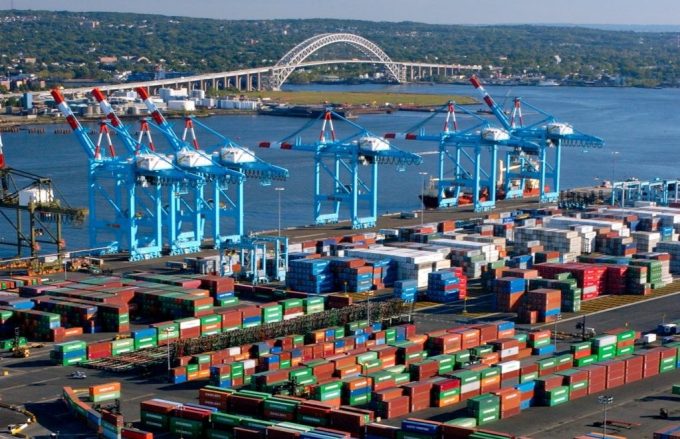Carriers launch new transpac shuttle services as Chinese exports surge
Container lines on Asia-America trades are set to take advantage of strong demand propelled by ...
TFII: SOLID AS USUALMAERSK: WEAKENINGF: FALLING OFF A CLIFFAAPL: 'BOTTLENECK IN MAINLAND CHINA'AAPL: CHINA TRENDSDHL: GROWTH CAPEXR: ANOTHER SOLID DELIVERYMFT: HERE COMES THE FALLDSV: LOOK AT SCHENKER PERFORMANCEUPS: A WAVE OF DOWNGRADES DSV: BARGAIN BINKNX: EARNINGS OUTODFL: RISING AND FALLING AND THEN RISING
TFII: SOLID AS USUALMAERSK: WEAKENINGF: FALLING OFF A CLIFFAAPL: 'BOTTLENECK IN MAINLAND CHINA'AAPL: CHINA TRENDSDHL: GROWTH CAPEXR: ANOTHER SOLID DELIVERYMFT: HERE COMES THE FALLDSV: LOOK AT SCHENKER PERFORMANCEUPS: A WAVE OF DOWNGRADES DSV: BARGAIN BINKNX: EARNINGS OUTODFL: RISING AND FALLING AND THEN RISING

New York & New Jersey has eclipsed Long Beach to become to the second-biggest US port, behind Los Angeles, which recorded a total of 467,763 teu of imports during June.
The port of NY/NJ recorded a stellar performance in June, seeing a 47.8% year-on-year increase in its throughput, to 390,169 teu, and 29.3% higher than in 2019.
Overall, container imports through the top ten US container ports in June were 32.5% up on the same month of 2020, although more relevant and impressive was the 19.2% increase on pre-Covid June 2019 throughput.
It has been well documented that the huge hike in imported goods is being driven by American consumers eager to spend savings from travel, services and entertainment accumulated during lockdown.
Moreover, there appears to be no sign of this insatiable appetite for consumer goods ‘made in China’ subsiding in the coming months, with carriers continuing to report bumper bookings and exceptionally strong forecasting well after the traditional peak season.
The monthly port throughput analysis from Blue Alpha Capital recorded a total of 2,033,400 teu imported through US ports in June, of which 1,043,659 teu was moved through the west coast.
This represented a year-on-year increase of 21.9%. But US east and Gulf coast container terminals saw a massive 52.3% uplift, highlighting an accelerating coastal shift, given more momentum from west coast port congestion.
Notwithstanding the impact of the Covid outbreak at China’s Yantian port complex, stymieing some west coast cargo, author of the report John McCown argues that the swing towards east coast hubs indicates “shippers are electing to switch in an attempt to avoid congestion issues that have been most visible at west coast ports”.
He said: “Those decisions are made easier by the fact that linehaul transport costs of moving containers to most eastern points are irrefutably lower with all or more water vessel service to the east coast compared to rail intermodal service via the west coast.”
Indeed, in terms of distance from the coasts, the consultant notes that 24% of the US population live nearer the west coast, while 76% live in closer to the east coast ports.
Mr McCown also suggested that shippers were looking longer-term, realising that container ports on the US east coast still had “room to grow”.
“Furthermore, as more shippers measure and take into account the carbon emissions of their freight-related activities, they may rethink their routing preferences,” he added.
Meanwhile, Blue Alpha Capital data recorded a 1.7% year-on-year improvement in laden export containers, for a total of 824,399 teu, which was, however, 10% lower than in June 2019, evidencing the juxtaposition between the strength of the two markets.
Comment on this article